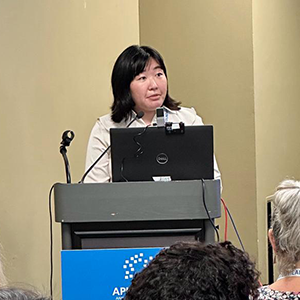By 2050, the number of people aged 60 and older is expected to reach approximately 2 billion worldwide according to the World Health Organization (WHO). This number highlights an urgent need for innovative health care solutions. At the forefront of this effort is a faculty member in The University of New Mexico’s College of Population Health whose innovative research is redefining care for older adults and vulnerable populations.

Grace Chung, PhD, MPH, began working for the UNM College of Public Health in July 2023 as an assistant professor. A significant part of her work is collaborating with health care providers and policymakers to develop interventions and policies that advance health equity and enhance outcomes for underserved populations.
Chung's research addresses challenges in the health care system, particularly focusing on the growing demographic of older adults. An aging population significantly increases health care demands, especially for chronic condition management and specialized services. This can lead to an increased need for practitioner visits, higher health care costs and scheduling conflicts for patients and their families. As this senior population continues to grow, her work emphasizes the need for research on quality of life and barriers to health care access.
In a recent study published in Telemedicine Reports, Chung investigated the influence social support had on telehealth utilization among older adults during the COVID-19 pandemic. The study revealed that living with family or receiving technical support was linked to increased telehealth use. This shows how assisting older adults with technology helped them navigate the challenges of accessing virtual care.
In an effort to improve access to care, Chung has also contributed to policy development by working with the College of Population Health Center for Health Policy to design a Medicaid program in New Mexico that implements palliative care in home- and community-based settings. Palliative care is specialized medical care for people living with a serious illness. This initiative aims to increase health care access for aging populations. Her focus remains on supporting older adults, particularly those with serious, life-limiting illnesses, providing extra support for this vulnerable group through continued research and teaching.
In addition to health care access, Chung’s work also includes research into the impacts of tobacco usage on chronic conditions among older adults. Chung is currently investigating the effects of electronic nicotine delivery systems (ENDS) like e-cigarettes and vapes. She’s looking specifically at tobacco dependence symptoms and cessation outcomes among U.S. older adult cigarette smokers, utilizing 2013-2023 data from the Population Assessment of Tobacco and Health (PATH) Study. She is also examining peer and family influences on cessation outcomes. This project was funded by a 2023 COPH Supporting Early Career Faculty (SECF) pilot award. She is also writing a proposal to assess how military exposures and tobacco use may have a multiplicative effect on risk of chronic conditions in post-deployment veterans in collaboration with the New Mexico Veterans Affairs Healthcare System and UNM Health Sciences Center faculty. This research would contribute to a broader understanding of long-term health impacts on veteran populations, which includes a sizable group of older adults.
Chung's efforts to strengthen health equity and improve care for aging populations serve as an inspiration to the public health community. Her research, collaborative spirit, and commitment to driving meaningful change are paving the way for a more equitable and accessible health care system. As the world faces the challenges of an aging population, Chung's work offers practical solutions and insights that will undoubtedly shape the future of health care delivery. With her continued research and contributions, Chung aims to make a lasting impact on the lives of others, ensuring that all people, regardless of age or background, have access to the care they need and deserve.